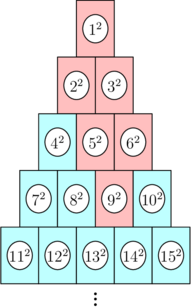CF1829G Hits Different
题目描述
在一个嘉年华游戏中,有一个巨大的易拉罐金字塔,共有 $2023$ 行,编号方式如图所示。

如果最初击中编号为 $9^2$ 的易拉罐,那么图中所有红色的易拉罐都会倒下。
你向金字塔扔一个球,球击中了编号为 $n^2$ 的易拉罐。这会导致所有堆叠在该易拉罐上方的易拉罐都倒下(即,$n^2$ 号罐倒下,然后直接在其上方的罐也倒下,再然后是再上方的罐,依此类推)。例如,上图展示了击中 $9^2$ 号罐时会倒下的所有罐。
请问所有倒下的易拉罐编号之和是多少?注意,$n^2 = n \times n$。
输入格式
第一行包含一个整数 $t$($1 \leq t \leq 1000$),表示测试用例的数量。
每个测试用例占一行,包含一个整数 $n$($1 \leq n \leq 10^6$),表示你击中的易拉罐编号为 $n^2$。
输出格式
对于每个测试用例,输出一个整数,表示所有倒下的易拉罐编号之和。
请注意,对于某些测试用例,答案可能无法用 32 位整数类型存储,因此你应当在你的编程语言中使用至少 64 位整数类型(如 C++ 的 long long)。对于所有有效输入,答案都能用 64 位整数类型存储。
说明/提示
第一个测试用例如题面所示。所有倒下的易拉罐编号之和为 $1^2 + 2^2 + 3^2 + 5^2 + 6^2 + 9^2 = 1 + 4 + 9 + 25 + 36 + 81 = 156$。第二个测试用例中,只有编号为 $1^2$ 的罐倒下,所以答案是 $1^2=1$。第三个测试用例中,编号为 $1^2$ 和 $2^2$ 的罐倒下,所以答案是 $1^2+2^2=1+4=5$。第四个测试用例中,编号为 $1^2$ 和 $3^2$ 的罐倒下,所以答案是 $1^2+3^2=1+9=10$。第五个测试用例中,编号为 $1^2$、$2^2$ 和 $4^2$ 的罐倒下,所以答案是 $1^2+2^2+4^2=1+4+16=21$。
由 ChatGPT 4.1 翻译